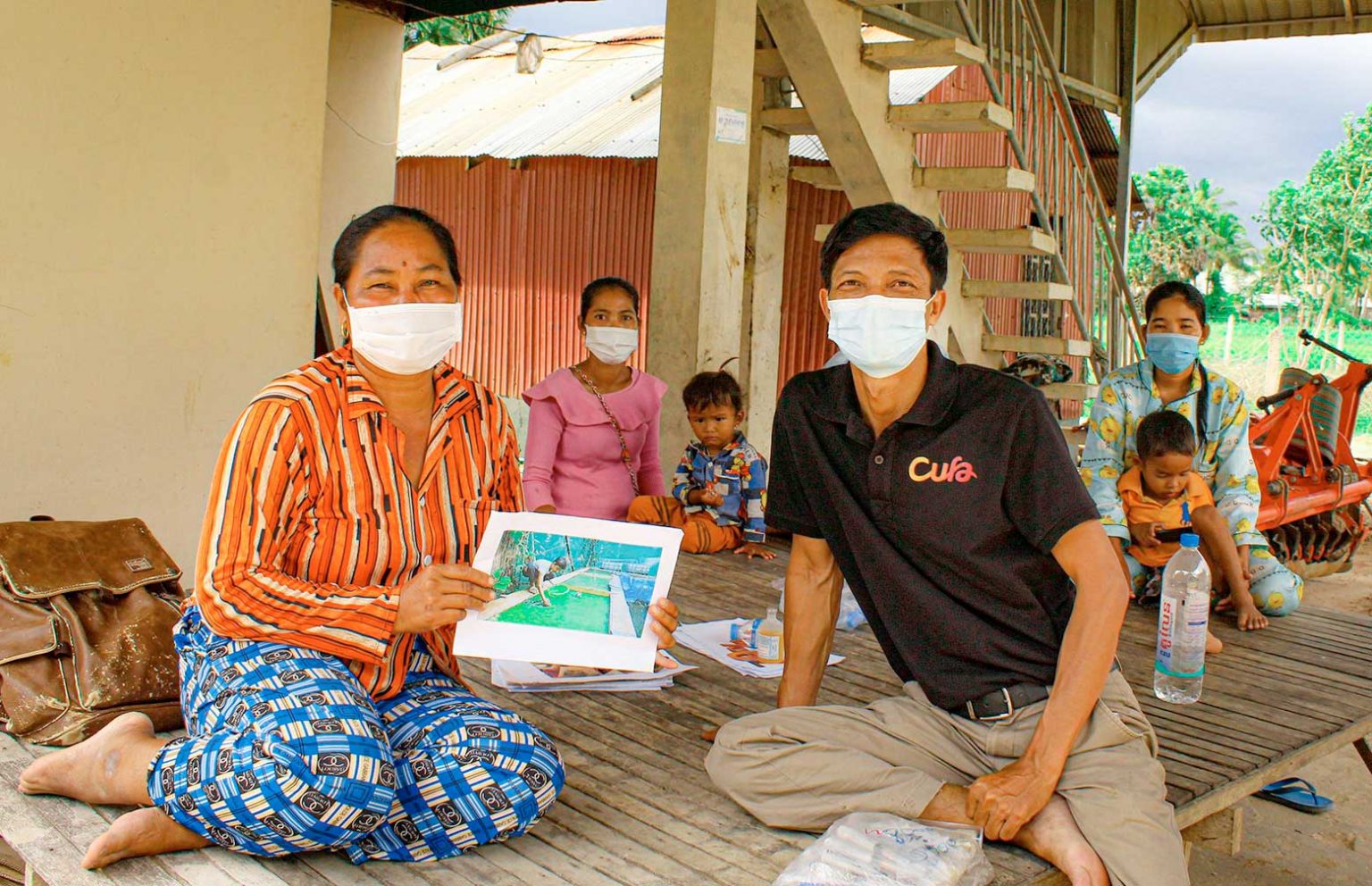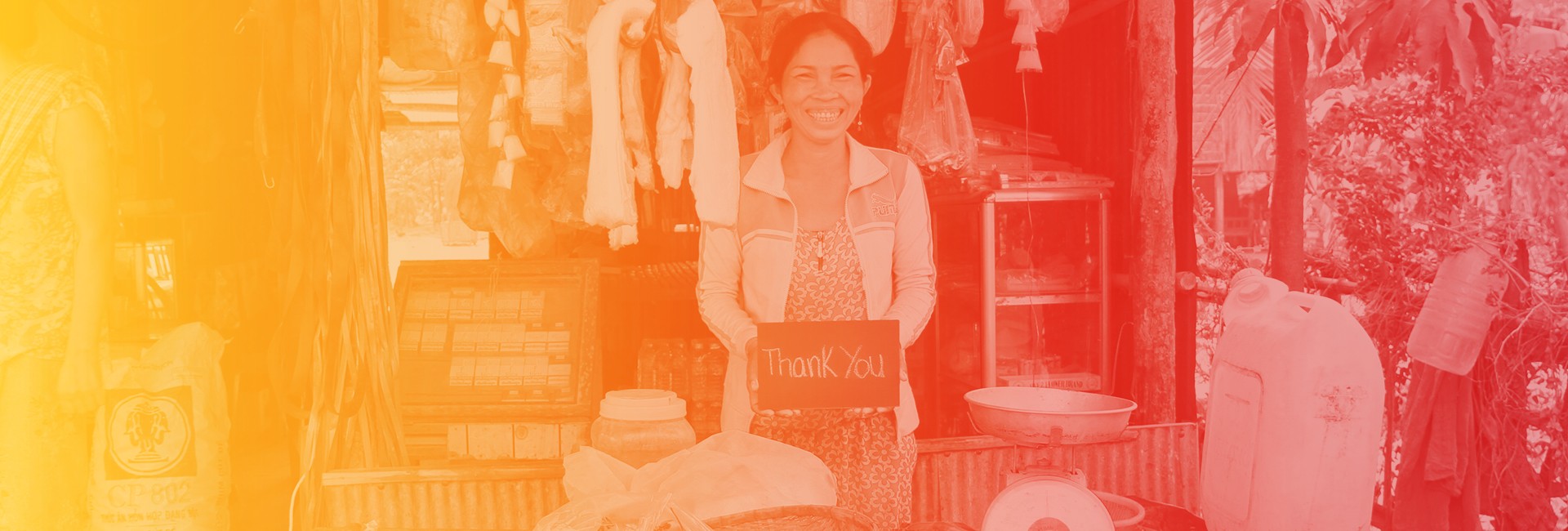By Ratha Ra, CUFA Cambodia and Alison Darcy, CUFA Australia
Bamboo, piglets and a pumping well might not be three items on the top of everyone’s shopping list, but thanks to the hard work and dedication of Village Entrepreneurs in Kandal village, Prey Veng province in Cambodia, they’re some of the most popular items that are helping this small community break out of poverty.
Just 70 kilometers outside Cambodia’s bustling capital of Phnom Penh, I’m on the back of a motorbike bumping along an unsealed road by the Mekong River. Soon after passing the ferry terminal you quickly notice the local market. A flurry of smells, sounds and stall vendors selling local products such as fish, meat and vegetables to travellers as they make their way down the national highway to Vietnam. Just past the markets there’s a small local road, still under construction which leads us to the small sleepy village of Kandal.
As you approach Kandal the first thing you notice is the people sitting under their houses. This is a common pastime in my country, a lot of houses are on stilts, and under the houses there’s often a bamboo bed, and in the heat of the day we enjoy taking a break from work and chatting to our neighbours.
Sitting on one of the bamboo beds, is Yun, one of 39 Village Entrepreneurs who are regular savers at Farming Development Association of Kg. Seong Commune savings bank. Yun’s house is different to the others in his community, the thatched roof and walls patched with palm leaves, it’s about half the size of the rest of the houses and unlike the other houses there’s no room for the bamboo bed under the house, it’s instead under a palmed awning.
I’m in Kandal to help CUFA’s Village Entrepreneur Coordinator Tola deliver training and interview Village Entrepreneurs for the quarterly progress reports. Over lunch I started speaking to Yun and immediately I’m impressed with his dedication and commitment and willingness to learn.
Yun left school at 12 years of age, to become a construction worker, the extra income to assist his parents raise himself and his siblings. Now at 28 years old, Yun himself is a father. After he and his wife had their third child, he knew his income of just $5 per day from construction work would not be enough to support his young family. Through his local savings bank he heard about others in his community who were starting small businesses and this promoted him to apply to become a Village Entrepreneur.
To help his family, Yun started a piggery business, thanks to a small investment from a staff group at Taggart Partners, his Australian Community Investor. “I wanted my children to have the opportunity receive a higher education than I did, for them to finish school and to maybe go to university”.
Being new to the world of pig pens, piglets and bookkeeping Yun was eager to attend training to learn how his one piglet could one day become five, 10 or even 20 pigs.
Speaking with Yun it became apparent just how much this new business venture meant to him and his family. Before receiving support from his Community Investor, Yun had already thought about his business work plan; how that one piglet could help him send his children to higher education and to also maybe, one day, build a new house.
Yun explained how after each training session he amends his business work plan, thinking of new activities that will help his business exceed. “In the first six months on the program I did not receive much profit, I used my funds to purchase goods that will help my business grow. I bought materials to help build my pig pen; nails, bamboo and also pig food and one piglet”.
18 months later, Yun’s piggery has expanded. “I purchase piglets, one costs about $50; I make sure I feed them organic food, keep them cool in summer, treat them for illnesses and clean their pig pen each day. When they start to grow I invite pig sellers to come visit my piggery, I then sell for the highest price, somewhere between $200 and $250. I now have five pigs in the pen and I sell one to two pigs every three months”.
While Yun is explaining this to me, I notice him smile. “Before, the money I earned was just enough to buy eggs for our family dinner and sometimes meat. I can now buy fish and pork for my family each day, not just eggs anymore. We’ve also spent some of the profits to buy the children some new clothes like school uniforms”.
For many community members like Yun one of the greatest challenges they face is a lack of clean drinking water, with many of the communal wells contaminated with arsenic and local rivers unsafe to drink. “Our family would drink from the pond and rain tanks, and we’d get diarrhea sometimes” explains Yun.
After selling one his pigs, Yun used the profits to invest in a pumping well. “It is the first one I’ve ever owned” he says proudly. The pumping well not only provides a clean water source for Yun and his young family but also his extended family who live in an adjacent hut. Although it’s still early days, Yun says the pumping well will significantly reduce the amount of time needed to fetch water, the amount of money on treating water-related illnesses and also help him keep his pigs healthy.
Bamboo, piglets and pump wells not your everyday shopping list items, but three small things that are making a big difference to families like Yun’s. There are many other families like Yun’s in Cambodia and Timor-Leste who have a business plan that is just looking for a small investment to get it started.
By starting a staff group you could help to drastically improve the living standards of a family like Yun’s. An investment of less than $1.25 a day, not only helps families like Yun’s but entire communities. An investment in one village entrepreneur is an investment in an entire community. Visit www.ve.org.au to show your support.







